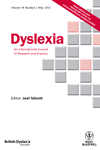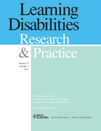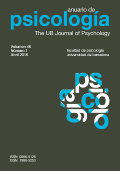
DYSLEXIA
Scope & Guideline
Exploring innovative strategies for dyslexia intervention.
Introduction
Aims and Scopes
- Research and Assessment of Dyslexia:
The journal focuses on the identification and assessment methods for dyslexia, including the evaluation of existing definitions and the development of new assessment tools. - Interventions and Instructional Strategies:
It emphasizes effective interventions targeting literacy skills, such as phonological awareness, spelling, and reading comprehension, particularly in diverse populations and educational settings. - Cognitive and Neurocognitive Aspects:
Research on the cognitive processes involved in dyslexia, including phonological processing, visual attention, and the neurocognitive underpinnings of reading difficulties, is a core area of interest. - Social and Emotional Dimensions:
The journal also explores the social and emotional challenges faced by individuals with dyslexia, including mental health issues, anxiety, and the influence of educational environments. - Multilingual and Cultural Perspectives:
There is a commitment to understanding dyslexia within multilingual and cross-cultural contexts, examining how language and culture impact literacy development and assessment.
Trending and Emerging
- Interventions Utilizing Technology:
There is an increasing focus on the use of technology in interventions, such as online treatment programs and tools like text-to-speech, which aim to enhance reading comprehension and literacy outcomes for dyslexic individuals. - Mental Health and Dyslexia:
Research is trending towards understanding the interplay between dyslexia and mental health, with studies addressing anxiety, coping strategies, and resilience among individuals with dyslexia. - Cultural and Linguistic Diversity:
Emerging themes emphasize the need for research that addresses dyslexia in diverse linguistic and cultural contexts, recognizing the unique challenges faced by bilingual and multilingual learners. - Dynamic and Comprehensive Conceptualizations:
A shift towards more dynamic and comprehensive understandings of dyslexia is evident, moving away from rigid definitions to include a broader range of cognitive, emotional, and social factors. - Interdisciplinary Research Approaches:
There is a notable increase in interdisciplinary collaboration, integrating insights from psychology, education, linguistics, and neuroscience to provide a more holistic view of dyslexia.
Declining or Waning
- Traditional Phonetics Approaches:
Research centered solely on traditional phonetic approaches to understanding dyslexia has seen a decline, as newer studies explore more holistic and interdisciplinary methodologies. - Generalized Definitions of Dyslexia:
The focus on broad, generalized definitions of dyslexia is diminishing in favor of more nuanced and context-specific definitions that address the complexities of the disorder. - Static Assessment Methods:
There appears to be a waning interest in static, one-time assessment methods, with a shift towards dynamic and ongoing assessment practices that better reflect individual progress and needs. - Overemphasis on Early Childhood Dyslexia:
While early intervention remains crucial, there is a decreasing emphasis on dyslexia solely within early childhood contexts, as research expands to include adult dyslexia and lifelong implications. - Single Language Focus:
Research that concentrates on dyslexia in a single language context is becoming less common, with an increased emphasis on bilingual and multilingual perspectives.
Similar Journals

Sibirskiy Psikhologicheskiy Zhurnal-Siberian Journal of Psychology
Unlocking the complexities of psychology in a dynamic landscape.Sibirskiy Psikhologicheskiy Zhurnal-Siberian Journal of Psychology, published by TOMSK STATE UNIVERSITY, is a dynamic platform dedicated to advancing the field of psychology through the dissemination of innovative research, perspectives, and theoretical discussions. With its ISSN 1726-7080 and E-ISSN 2411-0809, the journal focuses on a broad spectrum of psychological topics, offering invaluable insights and findings that contribute to both the local and global discourse in the field. Although it currently holds a Q4 rank in the miscellaneous category of psychology and a modest standing in Scopus rankings, this journal fosters a collaborative spirit among researchers, professionals, and students striving for academic growth and comprehensive understanding of psychological phenomena. The journal operates within an open-access framework, ensuring that knowledge is widely available, thereby enhancing its impact on the scientific community. As it continues to publish works from 2019 to 2024, the Sibirskiy Psikhologicheskiy Zhurnal remains a crucial resource for those seeking to explore the complexities of psychology in the Russian context and beyond.

ANNALS OF DYSLEXIA
Innovating solutions for dyslexia and related disorders.ANNALS OF DYSLEXIA is a prestigious academic journal published by SPRINGER, dedicated to advancing research in the fields of education and speech and hearing, particularly focusing on dyslexia and related language processing disorders. With its impactful insights, ANNALS OF DYSLEXIA holds a highly regarded position, boasting a Q1 category ranking in both education and speech and hearing as of 2023. The journal, which has been a vital resource since its inception in 1982, facilitates the dissemination of groundbreaking studies and innovative methodologies aimed at improving the understanding and intervention of dyslexia. Researchers and professionals in the field benefit from its comprehensive scope, supported by impressive Scopus rankings, including a top 10 position in Health Professions and a strong presence in Social Sciences. The journal provides a platform for practitioners, educators, and scholars to explore critical issues, share pragmatic solutions, and foster collaboration among interdisciplinary communities. As part of its commitment to the advancement of knowledge, ANNALS OF DYSLEXIA remains a cornerstone resource for those dedicated to enhancing educational outcomes for individuals with dyslexia.

Journal of Psychological and Educational Research
Empowering Scholars to Shape the Future of LearningJournal of Psychological and Educational Research, published by EDITURA UNIV ORADEA, serves as a crucial platform for the dissemination of scholarly work in the domains of psychology and education. With a strong focus on applied psychology, developmental psychology, and educational psychology, this journal provides a vital resource for researchers, practitioners, and students keen on exploring contemporary issues and advancements in these fields. Though it operates under a Q4 category in Applied Psychology and Developmental and Educational Psychology, it holds a respectable Q3 ranking in Education as of 2023, reflecting its growing influence amid an evolving academic landscape. The journal is open to diverse methodologies and perspectives, fostering interdisciplinary collaboration and innovation. With its archival span from 2011 to 2024, this journal not only enhances academic discourse but also contributes meaningful insights relevant to personal and educational development. Engage with the Journal of Psychological and Educational Research to stay at the forefront of research that shapes today and tomorrow in psychology and education.

CONTEMPORARY EDUCATIONAL PSYCHOLOGY
Decoding the Science of Learning and DevelopmentCONTEMPORARY EDUCATIONAL PSYCHOLOGY, published by Academic Press Inc. Elsevier Science, stands as a leading journal in the fields of developmental and educational psychology. With an impressive impact factor and ranked in the Q1 category for both Developmental and Educational Psychology and Education, it is recognized as a top resource for researchers and professionals seeking to explore the complexities of learning, development, and educational practices. The journal has been disseminating groundbreaking research since 1976 and continues to be relevant through 2024, showcasing innovative studies that inform educational theory and practice. Although the journal operates under a subscription model, it provides unparalleled insights and comprehensive reviews that cater to a diverse audience, including researchers, educators, and students. The rigorous peer-review process guarantees the high quality of published work, while its Scopus rankings affirm its significant contribution to the academic community, with standout positions in both the fields of social sciences education and developmental psychology. For those committed to advancing the intersection of psychology and education, CONTEMPORARY EDUCATIONAL PSYCHOLOGY is an indispensable scholarly resource.

Psicologia Educativa
Pioneering Research in the Intersection of Psychology and EducationPsicologia Educativa is a renowned academic journal dedicated to the field of educational psychology, published by the COLEGIO OFICIAL PSICOLOGOS MADRID. Since its initiation in 1995, this open access journal has become a significant platform for researchers and practitioners who seek to advance the scientific understanding of psychological principles in educational settings. With an impressive impact factor and recognition within the academic community—ranking in the Q3 quartile for Developmental and Educational Psychology and Q2 for Social Psychology in 2023—Psicologia Educativa is well-positioned to publish influential research that informs educational practices. The journal's scope spans a variety of topics within educational psychology, facilitating critical dialogue and innovative approaches in the realm of social interaction and development learning processes. By providing wide access to scholarly articles, it serves as an essential resource for students, researchers, and education professionals eager to contribute to the ever-evolving field of psychology.

Cognitive Research-Principles and Implications
Connecting Research with Real-World Applications.Cognitive Research: Principles and Implications, published by SPRINGER, is a premier open-access journal dedicated to the dynamic field of cognitive neuroscience and experimental psychology. Since its inception in 2016, this journal has rapidly established itself as a leading platform for disseminating innovative research, achieving impressive rankings of Q1 in both Cognitive Neuroscience and Experimental and Cognitive Psychology in 2023. With a Scopus ranking of #16 out of 165 in Experimental and Cognitive Psychology and #28 out of 115 in Cognitive Neuroscience, it serves as a vital resource for researchers and practitioners eager to explore the intricacies of cognitive processes. Operating from its base in the United Kingdom, the journal offers open access to its articles, ensuring that groundbreaking research is widely available and can influence both academic inquiry and real-world applications. As the field continues to evolve, Cognitive Research: Principles and Implications remains an essential reference point for advancing understanding in cognitive science, making it an indispensable tool for students, professionals, and academics alike.

READING AND WRITING
Unraveling the Complexities of Language and ThoughtREADING AND WRITING is a premier academic journal dedicated to exploring the interdisciplinary fields of education, linguistics, neuropsychology, and speech and hearing. Published by Springer, this journal has established itself as a leading platform for high-quality research, reflected in its impressive Q1 ranking across various disciplines in the 2023 journal quartiles. Covering significant advancements from its inception in 1989 through to 2024, READING AND WRITING emphasizes the critical interplay between reading and writing skills and their cognitive, linguistic, and educational implications. With its broad scope and commitment to advancing knowledge, this journal is invaluable for researchers, educators, and students aiming to deepen their understanding of literacy development and its impact on learning and communication. Although it operates without an open access model, the journal's rigorous peer-review process assures that published articles meet the highest academic standards, making it a reliable source of novel insights in these interconnected fields.

Journal of Intelligence
Connecting researchers to the world of intelligence.The Journal of Intelligence, published by MDPI, is a premier open access journal dedicated to advancing the understanding of intelligence in its multifaceted forms. Since its inception in 2013, this journal has made significant contributions to the fields of Cognitive Neuroscience, Developmental and Educational Psychology, and Experimental Psychology, consistently reflecting its growing impact within the academic community. Located in Switzerland, the journal benefits from a global reach and has been indexed in Scopus, achieving respectable ranks across various categories—highlighting its relevance and quality in Social Sciences and Psychology. With an impressive 2023 category quartile ranking of Q2 in Education and Q3 in other relevant fields, the journal is a valuable resource for researchers, professionals, and students seeking to explore theoretical and empirical aspects of intelligence. As an open access publication, the Journal of Intelligence not only promotes the free exchange of knowledge but also ensures that cutting-edge research is accessible to a wider audience, thus fostering innovation and collaboration in the quest to understand the nuances of human intelligence.

Learning Disabilities Research & Practice
Exploring the intersection of psychology and education.Learning Disabilities Research & Practice is a distinguished journal published by SAGE Publications Inc., dedicated to advancing research and practices surrounding learning disabilities. With a strong focus on the intersection of developmental psychology, education, and health, this U.S.-based journal plays a crucial role in disseminating innovative research findings and effective intervention strategies. As reflected in its impressive 2023 Quartile rankings, the journal stands in the Q1 category for both Education and Health (social sciences), indicating its significant impact within these fields. Furthermore, its placement in the Q2 category for Developmental and Educational Psychology demonstrates its relevance in psychological research. Learning Disabilities Research & Practice is indexed with a commendable Scopus ranking, making it an essential resource for researchers, professionals, and students committed to enhancing understanding and support for individuals with learning disabilities. While it operates under a subscription model, the journal's contributions to the field are indispensable, fostering a better understanding of learning challenges and promoting effective educational practices.

Anuario de Psicologia
Fostering Innovation in Psychological ScienceAnuario de Psicologia is a pivotal journal published by UNIV BARCELONA, FAC PSICOLOGIA, dedicated to the expansive field of psychology. Operating from Spain, this journal has been instrumental in exploring various dimensions of psychology since its inception and serves as a vital resource for researchers, professionals, and students alike. Recognized for its contributions to Psychiatry and Mental Health, as well as miscellaneous branches of psychology, it currently holds a Q4 ranking in both domains. Although it has no access options available, the journal's commitment to disseminating research from 2002 to 2009 and 2011 to 2024 underscores its ongoing relevance in the academic community. With a Scopus rank placing it at the 16th percentile for Psychiatry and Mental Health and the 13th percentile for General Psychology, Anuario de Psicologia continues to attract scholarly attention, making it an essential venue for articles addressing contemporary psychological phenomena.